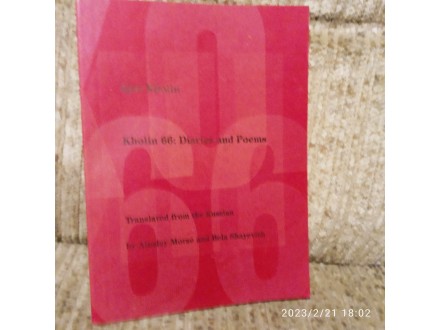KHOLIN 66: DIARIES AND POEMS Igor Kholin
| Cena: |
| Stanje: | Polovan bez oštećenja |
| Garancija: | Ne |
| Isporuka: | Pošta Post Express Lično preuzimanje |
| Plaćanje: | Tekući račun (pre slanja) Lično |
| Grad: |
Sombor, Sombor |
Godina izdanja: Ostalo
ISBN: Ostalo
Jezik: Engleski
Autor: Strani
KHOLIN 66: DIARIES AND POEMS
Igor Kholin
Translated by Ainsley Morse, Bela Shayevich
Ripley Whiteside, Illustrator
POETRY, TRANSLATION |
August 2017
Moments of brilliance and imagination shine through the welts and bruises...
Gary Sullivan
holin 66 is a trampoline into underground Soviet poet Igor Kholin’s life and work through the window of a single autumn. In a string of acerbically related non-adventures excerpted from his 1966 diary, Kholin moves to the country, sleeps a lot, drinks and debauches among Moscow’s literary underground, and eventually moves back to the city. Broke and bitter, he details his bemusement in terse, absurdist prose. The selection of Kholin’s poems features self-deprecating self-portraits, bleak views of the Moscow outskirts, and strange visions of life on other planets. Illustrated with Ripley Whiteside’s drawings of Kholin and his friends.
ABOUT THE AUTHOR
Igor Kholin was born in Moscow in 1920, ran away from an orphanage in Ryazan, and eventually enrolled in a military academy in Novorossiysk. He barely survived World War II (a bullet that grazed the corner of his lips came out of his back). In 1946, he was exiled from the military and Moscow for slapping a drunken comrade-in-arms. Kholin landed in a labor camp in Lianozovo, a suburb of Moscow, where one of his friends was the guard and would occasionally let him out to visit the Lianozovo library—he’d started writing poetry. When he asked to check out a book by forbidden poet Alexander Blok, he aroused the interest of the librarian, Olga Potapova, an artist married to the poet and painter Evgeny Kropivnitsky. The two of them hosted a Sunday salon out of their nearby barracks apartment, encouraging the work of young artists and a few poets, including Genrikh Sapgir and Vsevolod Nekrasov. Along with Kholin, they called themselves Kropivnitsky’s students and formed a loose poetry collective known as the Lianozovo Group. Kholin’s early work took the rough edges of Soviet life—the poverty, brutality and alcoholism rampant in the barracks—as his primary subject matter, while lampooning formulaic Socialist Realist poetics. The world that Kholin depicted in his poems, where abrupt death inevitably cut down two-dimensional stock characters, was too crude and inglorious to be considered poetry by official standards. Later years saw cycles of outer-space poems and a series of poetic self-portraits, simultaneously wildly superlative and deeply self-deprecating; but all of it equally unpublishable until the fall of the Soviet Union. Kholin barely supported himself with odd jobs: children’s book author, writing tutor, waiter and, after the 1970s, antiques dealer. Igor Kholin died in Moscow in 1999. Kholin 66 is the first book of Kholin’s work in English translation.
PRAISE
Morse and Shayevich’s English rendering of Igor Kholin’s vivid 1966 diary accomplishes what no time travel movie or TV show ever has: it makes us totally feel like we are there. Kholin chronicles his spavined, subsistence-level exploits as a notorious underground Soviet-era poet with a curt and caustic prose that makes Hemingway and Bukowski seem fey in comparison. Moments of brilliance and imagination shine through the welts and bruises, revealing a surprisingly supple thinker and commentator, and a poet whose harsh, stubby lines read like nothing else in print.
Gary Sullivan
Igor Kholin`s deadpan descriptions of the bleak banality of life in the outskirts of Moscow—with a resigned flatness often poked by prickly wit—feel current even half a century after he wrote them. Morse and Shayevich get the evergreen freshness of Kholin`s sharp tongue, and infuse it with their own contemporary intelligence and humor.
Brian Droitcour
Ainsley Morse and Bela Shayevich do to Kholin what they did before to Nekrasov: give him and his absurdities and bad mood a wonderful existence in English. This is a wonderful book.
Maged Zaher
Soaked in vodka, bad sex, misogyny, and self-deprecation, the diaries alone are a fascinating time capsule, supplemented by the excellent side-notes that provide thumbnail biographies of all the characters orbiting the Lianozovo world at that time.
Noel Black, Hyperallergic
Predmet: 73832329











